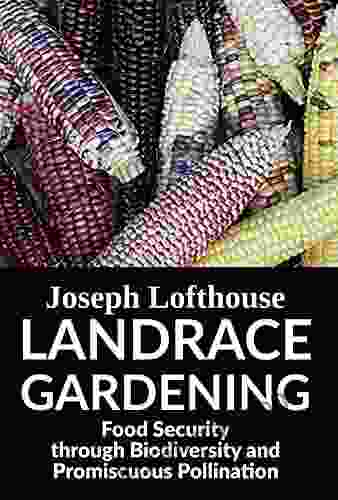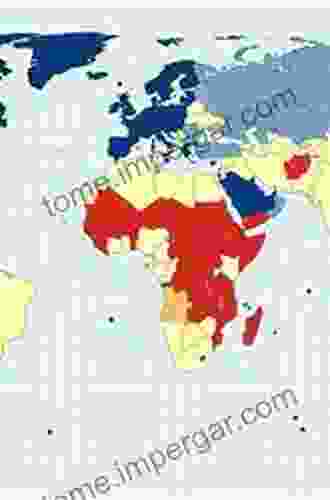Unlocking Food Security: The Power of Biodiversity and Promiscuous Pollination

4.7 out of 5
| Language | : | English |
| File size | : | 3715 KB |
| Text-to-Speech | : | Enabled |
| Screen Reader | : | Supported |
| Enhanced typesetting | : | Enabled |
| Print length | : | 190 pages |
In an era marked by burgeoning populations and escalating environmental challenges, ensuring global food security has become an imperative. The preservation and enhancement of biodiversity, coupled with the promotion of promiscuous pollination, offer potent solutions to this pressing issue.
The Nexus of Biodiversity and Food Security
Biodiversity encompasses the vast array of living organisms on Earth, including their genetic material and the intricate ecosystems they inhabit. Over 70% of the world's food supply depends on biodiversity, with more than 2 billion people reliant on small-scale farming and local biodiversity for sustenance.
Biodiversity safeguards food security in multiple ways:
- Genetic Diversity: Biodiversity provides a reservoir of genetic resources essential for developing new crop varieties resilient to pests, diseases, and climate change.
- Ecosystem Services: Biodiversity supports ecosystem services such as pollination, pest control, nutrient cycling, and soil fertility, all of which are crucial for agricultural productivity.
- Food Security Net: Diverse ecosystems offer a safety net during periods of crop failure or food shortages, providing alternative food sources from wild plants and animals.
The Vital Role of Promiscuous Pollination
Pollination is the transfer of pollen from the male anther to the female stigma of a flower, leading to fertilization and seed production. Promiscuous pollination refers to the pollination of a flower by pollen from different sources, increasing genetic diversity and seed vigor.
Promiscuous pollination:
- Enhances Crop Productivity: Cross-pollination between genetically diverse plants results in increased crop yields and larger, healthier fruits and vegetables.
- Resilience to Threats: Promiscuous pollination introduces a wider gene pool, enhancing the resilience of crops to pests, diseases, and environmental stressors.
- Improved Nutritional Value: Cross-pollination can lead to the development of new varieties with higher nutritional content and improved flavor.
Empowering Promiscuous Pollination
To harness the full potential of promiscuous pollination, it is essential to:
- Promote Pollinator Diversity: Encourage the presence of a wide range of pollinators such as bees, butterflies, birds, and bats by providing diverse habitats and reducing pesticide use.
- Plant Diversified Crops: Plant a variety of crops that flower at different times to attract pollinators and facilitate cross-pollination.
- Encourage Agroforestry: Integrate trees and shrubs into agricultural landscapes to offer habitats for pollinators and provide additional food sources.
By embracing biodiversity and promoting promiscuous pollination, we can create more sustainable and resilient agricultural systems capable of meeting the growing food demands of our planet while safeguarding the delicate balance of our ecosystems. The insights presented in this article provide a roadmap towards unlocking food security and ensuring a thriving future for generations to come.
To delve deeper into these transformative concepts, we highly recommend the comprehensive book "Food Security Through Biodiversity And Promiscuous Pollination," which offers a wealth of scientific evidence and practical advice.
Free Download Now
4.7 out of 5
| Language | : | English |
| File size | : | 3715 KB |
| Text-to-Speech | : | Enabled |
| Screen Reader | : | Supported |
| Enhanced typesetting | : | Enabled |
| Print length | : | 190 pages |
Do you want to contribute by writing guest posts on this blog?
Please contact us and send us a resume of previous articles that you have written.
 Book
Book Novel
Novel Page
Page Chapter
Chapter Text
Text Story
Story Genre
Genre Reader
Reader Library
Library Paperback
Paperback E-book
E-book Magazine
Magazine Newspaper
Newspaper Paragraph
Paragraph Sentence
Sentence Bookmark
Bookmark Shelf
Shelf Glossary
Glossary Bibliography
Bibliography Foreword
Foreword Preface
Preface Synopsis
Synopsis Annotation
Annotation Footnote
Footnote Manuscript
Manuscript Scroll
Scroll Codex
Codex Tome
Tome Bestseller
Bestseller Classics
Classics Library card
Library card Narrative
Narrative Biography
Biography Autobiography
Autobiography Memoir
Memoir Reference
Reference Encyclopedia
Encyclopedia Hans Joachim Koerver
Hans Joachim Koerver Shannon Dingle
Shannon Dingle Beth Mccoll
Beth Mccoll Lucia Volk
Lucia Volk Steven M Nadler
Steven M Nadler David Money Harris
David Money Harris Yolanda Pico
Yolanda Pico Dr Drago Herenda
Dr Drago Herenda Piet Van Mieghem
Piet Van Mieghem Bailey White
Bailey White Susan Anderson
Susan Anderson Bence Nanay
Bence Nanay Ben Everson
Ben Everson Bj Stromme
Bj Stromme Tom Mcdonald
Tom Mcdonald Ben Fogle
Ben Fogle Bernard Reginster
Bernard Reginster John N Powers
John N Powers Michael Willrich
Michael Willrich Ben Fine
Ben Fine
Light bulbAdvertise smarter! Our strategic ad space ensures maximum exposure. Reserve your spot today!
 Herbert CoxFollow ·6.9k
Herbert CoxFollow ·6.9k Ruben CoxFollow ·2.3k
Ruben CoxFollow ·2.3k Anthony WellsFollow ·2.7k
Anthony WellsFollow ·2.7k Chadwick PowellFollow ·8.9k
Chadwick PowellFollow ·8.9k Michael ChabonFollow ·2.9k
Michael ChabonFollow ·2.9k Doug PriceFollow ·17k
Doug PriceFollow ·17k Spencer PowellFollow ·4.4k
Spencer PowellFollow ·4.4k Bill GrantFollow ·12.6k
Bill GrantFollow ·12.6k

 Edison Mitchell
Edison MitchellFrench Strategy and Operations in the Great War
An In-Depth Examination of Military Genius ...

 Harvey Hughes
Harvey HughesArts In Health: Designing And Researching Interventions
Delving into the...

 Walt Whitman
Walt WhitmanHealing and Hope for Those with Empty Arms
A Comprehensive Guide for Grieving...

 DeShawn Powell
DeShawn PowellUniversity of Maine Ice Hockey: A Legacy of Frozen Glory
Nestled in the heart of Maine, a state...

 George Hayes
George HayesControl For Aluminum Production And Other Processing...
In today's competitive manufacturing...

 Ben Hayes
Ben HayesThe Lost Obelisks Of Egypt: A Journey into the Depths of...
: The Enduring Allure of Egypt's Ancient...
4.7 out of 5
| Language | : | English |
| File size | : | 3715 KB |
| Text-to-Speech | : | Enabled |
| Screen Reader | : | Supported |
| Enhanced typesetting | : | Enabled |
| Print length | : | 190 pages |












